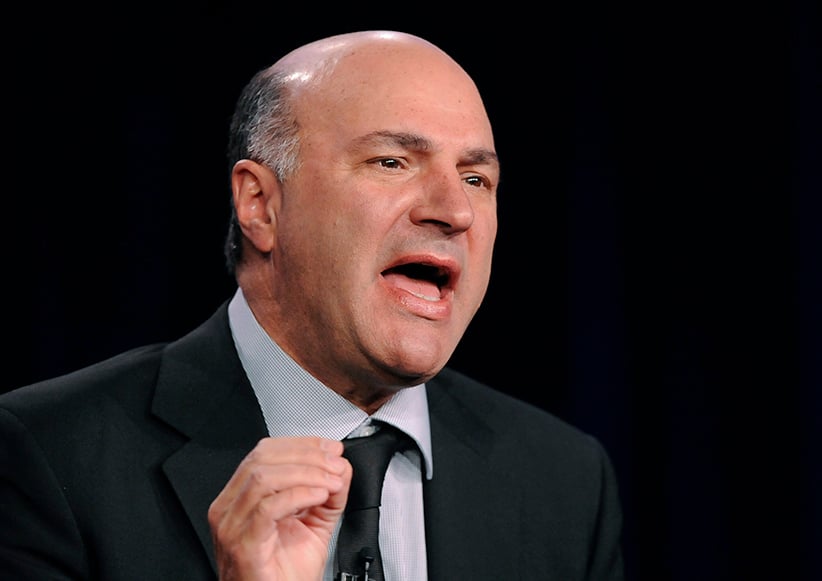Farewell to Kevin O’Leary, a man who didn’t come back for you
The many reasons Kevin O’Leary had no shot at the Conservative leadership—and the missteps he’s made, even since dropping out
Newly announced Federal Conservative leadership candidate Kevin O’Leary leaves a television studio following an interview in Toronto on Wednesday January 18, 2017. (Chris Young/CP)
Share

Days after the Senators dropped the Bruins off at the golf course, Ottawa has claimed another of Boston’s favourite sons: businessman Kevin O’Leary has announced his shock departure from the Conservative leadership race.
The reason? O’Leary told the Globe and Mail that he couldn’t carry Quebec. It turns out not speaking French is a barrier to growth in Canada’s French-speaking province. Who saw that coming? Oh, right, everybody. Occam’s razor slits another throat.
Not that there weren’t good reasons that an O’Leary-led Conservative Party would have been D.O.A. outside la belle province, too. Here, we are spoiled for choice.
For all of his bravado and bluster, O’Leary had a hard time feigning interest in Canada. During the nearly four months of his candidacy he was out of the country almost as much as he was in it and, when he was “home”, he didn’t sound like someone who knew too much about the nation he wanted to lead (just Google “O’Leary” and “constitution”, or “O’Leary” and “equalization”.)
What’s worse, O’Leary knew even less about the Conservative Party. He made crass comments about the military, shrugged at gay marriage and legalizing pot, and excelled only at sending snotty letters to the premiers, as if a lack of Tory nastiness was the party’s problem.
WELLS: What happens to the Conservative leadership race now?
The good news for O’Leary is that not much will change in his day-to-day life. Mr. Wonderful is free to go back to his preferred habitat of U.S. television to engage in his favourite activity: smashing the dreams of others—albeit now with an embarrassing black mark on his resume. L’arroseur est arrosé (look it up, Kevin).
With O’Leary terminating his candidacy, “Mad” Maxime Bernier becomes the favourite, receiving O’Leary’s endorsement for his ability to carry his home province. And…that’s it.
O’Leary went out of his way to specify that the only reason for his Bernier endorsement was the Quebec politician’s perceived ability to win a significant number of seats in his home province—not for Bernier’s brave decision to oppose supply management, or his equally bold pledge to eliminate corporate handouts, or even for his plans to smash the maple syrup lobby.
Although he couched his withdrawal in altruistic terms, it’s clear O’Leary thinks Max is a winner, and so he’s going to tag along in the hopes, presumably, that his back will be scratched at a later date.
Did O’Leary make the smart play? Not necessarily. Even now, on his way out the door, O’Leary couldn’t avoid advertising his ignorance. Maxime Bernier might be king of the Beauce, but he’s not royalty elsewhere in Quebec (which, incidentally, O’Leary called “the Florida of Canada” in his joint press conference with Bernier). In fact, the very policies that make Bernier such an intriguing choice are the ones that are hardest to sell in his own province, home as it is to many a supply-managed cow and chicken, Bombardier, and a significant number of Canada’s maple trees.
The radical nature of so much of Bernier’s policy is undoubtedly giving hope at the moment to Erin O’Toole and Andrew Scheer, the two “safe” candidates with room to grow. But in the end, it might not even be O’Leary who plays the kingmaker in the Conservatives’ ranked-ballot system. The hardest second-choices to woo belong to Kellie Leitch’s supporters, and the eventual winner will have to find some way to play to her crowd that doesn’t scare the crap out of the more moderate voters up for grabs in the next election. Expect Bernier, O’Toole and Scheer to start dropping hints in Leitch’s direction over the coming weeks.
MORE: Kevin O’Leary, an inspiration to unqualified hacks everywhere
Even in his political death, though, O’Leary is managing to do what only he has been capable of in the four months since his entry into the leadership race: dominate the media’s coverage. Tonight should be about the final Conservative leadership debate and the policy choices on offer to Conservative members. Instead, everyone will be talking about a guy who never really had a chance, yet still managed to fool a considerable number of people into thinking he was a contender.
So ends one of the strangest interregnums in Canadian political history—if, that is, history is kind enough to grant O’Leary a footnote.
Andrew MacDougall is a London-based columnist and commentator. He was a director of communications to Stephen Harper.